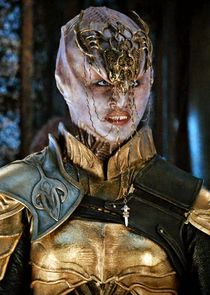Also worthy of note in this thread may be Jadzia's little editorial addition to Martok's house saga in "You Are Cordially Invited" (DS9)...
DAX: ...but the Second Dynasty ended when General K'Trelan assassinated Emperor Reclaw. For the next ten years, the Empire was ruled by a Council elected by the people. Modern-day Klingon historians refer to this as "The Dark Time," but it's interesting to note that this first and only experiment in Klingon democracy actually produced several reforms...
Whether or not it may have any bearing on the particular issue of women serving, it at least demonstrates that periods of progress followed by regression are scarcely unheard of in Klingon history.
Returning to this, I meant to add that the above also further reinforces that Klingon notions of what constitutes
progression versus what constitutes
regression can indeed run very counter to our own. As does the example from "Judgment" (ENT) that
@Kennelly cites.
Possibly but not necessarily. After all, we never ever heard of a female High Council Member in any era. Only the leadership ever befell on female hands.
I guess I'm not seeing how you would account for Gowron dismissing Picard's question in "Redemption" (TNG) of whether Lursa and B'Etor would
claim the leadership by saying women could not
serve on the Council, then?
And I can't say I read Gowron as insincere when he tries to bribe K'Ehleyr with the prospect of a seat on the Council in "Reunion" (TNG), personally...but of course there is nevertheless still ambiguity as to whether they currently can or can't at that point, because she replies that such opportunities would present themselves only if he came to power. So that reference is indeed a bit of a wash as far as pinning anything down, as you say.
But for all we know, Gowron may well have changed a lot of things in service of his own interests, over time. He could even have revived the title/position of Chancellor after it had been supplanted by that of Council Leader earlier in the century, too, whatever the difference might or might not be. Perhaps he desired some additional consolidation of powers, or simply a little extra prestige, once there was an Emperor again to compete with as a figurehead following "Rightful Heir" (TNG)?
As for Dennas...Burnham said in a flashback to the time of her Vulcan education in "The Vulcan Hello" (DSC) that the Klingon "political order" then consisted of 24 Great Houses, and reiterated in the present day of "Battle At The Binary Stars" (DSC) that 24 Great Houses made up the Council. However, it wasn't really made entirely clear if those would necessarily be the
same 24 between both references, or if that number is in some way prescribed and various Houses are ever-squabbling in competition to be among its ranks, nor whether the Council Members would by default be the House Leaders, or if they delegate representatives that may or may not be themselves, or what. (In the 24th century, they
aren't always House Leaders.) Kol implies seats must be "earned" by saying T'Kuvma has failed to do so, but specifies no further as to how such earning would be accomplished.
Interestingly, later in "Lethe" (DSC) it is said that Kol has established a "new ruling Council" and has
ousted House D'Ghor and House Mókai, both of which were led
by women—well, the latter has Matriarchs anyway, per "The Butcher's Knife Cares Not For The Lamb's Cry" (DSC), even if their apparent representative on the Council, Ujilli, is male—and are now acting independently. Of course, this might have been merely part of the grand deception designed to lure Sarek there to be taken hostage...but not necessarily, because it is only after their unexpected over-achievement of landing him Cornwell that Kol says they have proven themselves worthy of a place in his new Empire. In any case, Dennas is later seen in Council Chambers in "Will You Take My Hand" (DSC).
Yeah, I think it is pretty clear that the High Council is composed of the leaders of the great houses.
Oh, and Dennas was apparently the representative of house D'Ghor in the High Council, so that is at least one female high councillor.
They can wear wtf this thing is, but they can't have hair?

That "thing" she's wearing seems to have been inspired by the somewhat similar headdresses worn by Valkris in STIII and Sirella in "You Are Cordially Invited" (DS9):
http://startrekpropcollector.com/trekauctions/item.pl?i=5574
http://startrekpropcollector.com/trekauctions/item.pl?i=3567
-
MMoM

 It's not on your profile...
It's not on your profile...





